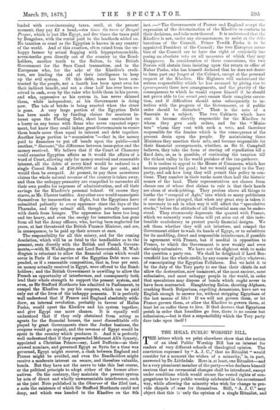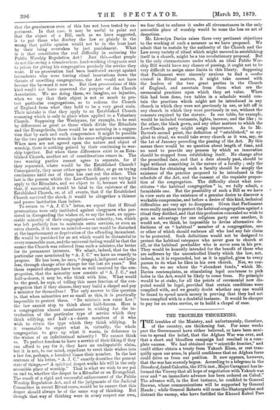THE IDEAL PUBLIC WORSHIP MIL.
THE letters which we print elsewhere show that the notion of an ideal Public Worship Bill has an interest for readers of very different schools of theological opinion. The conviction expressed by "A. J. C.," that no Ritualist "would consider for a moment the wishes of a minority," is, in part, answered by Dr. Littledale. Here is, at least, one Ritualist—and he a very prominent member of the party—who declares himself anxious that no ceremonial changes shall be introduced, except under conditions which would secure the vested rights of con- gregations to have public worship celebrated in the accustomed way, while allowing the minority who wish for change to pro- vide chapels of 2ease for themselves. Still, "A. J. C." may object that this is 'only the opinion of a single Ritualist, and that the genuineness even of this has not been tested by ex- periment. In that case, it may be useful to point out that the object of a Bill, such as we have suggested, is to put those who disobey the law so plainly in the wrong that public opinion would not be in the least hurt by their being overtaken by just punishment. What is it that constitutes the real difficulty in enforcing the Public Worship Regulation Act? Just this,—that people do not like seeing a conscientious, hard-working clergyman sent to prison for giving his congregation precisely the service they want. If no prosecution had been instituted except against incumbents who were forcing ritual innovations down the throats of unwilling congregations, the Act would not have become the by-word it now is. But then prosecutions of this kind would not have answered the purpose of the Church Association. We are doing them, we imagine, no injustice, when we say that their object is not so much to pro- tect particular congregations, as to redeem the Church of England from what they hold to be a very great stain. Their mistake is that they apply to an Established Church reasoning which is only in place when applied to a Voluntary Church. Supposing the Wesleyans, for example, to be rent by differences as great as those which divide the Ritualists and the Evangelicals, there would be no meaning in a sugges- tion that by such and such compromises it might be possible for the two parties to remain in the same religious communion. When men are not agreed upon the nature and object of worship, there is nothing gained by their continuing to wor- ship together. But when these differences exist in an Esta- blished Church, another set of considerations comes in. The two warring parties cannot agree to separate, for if they separated, where would be the Established Church ? Consequently, they must either agree to differ, or go on trying conclusions until one of them has cast out the other. This last is the process which the Low-Church party are trying to apply to the Ritualists, and we object to it, because we hold that, if successful, it would be fatal to the existence of the Established Church, or, at all events, that if the Established Church survived the shock, it would be altogether a thinner and poorer institution than before. To return to "A. J. C.'s " letter, we repeat that if Ritual prosecutions were only instituted against clergymen who per- sisted in disregarding the wishes of, to say the least, an appre- ciable minority of their congregation—a minority, too, which was left perfectly free to maintain extra services, or even an extra church, if it were so minded—no one would be disturbed at the imprisonment or deprivation of the offending incumbent. He would be punished for an act which would be distasteful to every reasonable man, and the universal feeling would be that the sooner the Church was relieved from such a minister, the better for its permanent interests. We admit, indeed, that for the particular case mentioned by "A. J. C." we have no remedy to propose. He has been, he says, "dragged, indignant and help- less, through change after change for the last six years." But these repeated changes have been so well received by the con- gregation, that the minority now consists of "A. J. C.," and half-a-dozen, it may be, who think with him. What would be the good, he says, of telling this mere fraction of the con- gregation that if they choose, they may build a chapel and pay a minister for themselves ? The only answer to this question is, that when minorities are so small as this, it is practically impossible to protect them. "De minimis non curat Lex:" the law cannot stop to think about half-dozens. Here is a congregation almost unanimous in wishing for the in- troduction of the particular type of service which they think edifying, and half - a - dozen members of it who wish to retain the type which they think edifying. Is it reasonable to expect what is, virtually, the whole congregation to give up what it wants, in deference to the wishes of an infinitesimal minority ? We cannot think so. To perfect freedom to have a service of their liking if they can afford to pay for it, they have an undisputable claim, but it is not, to our mind, expedient to erect their wishes into a law for, perhaps, a hundred times their number. In the last sentence of his letter, "A. J. C." exactly describes the present state of things,—" A spiritual despot works his will in the only accessible place of worship." That is what we wish to see put an end to, whether the despot be a Ritualist or an Evangelical. The result of a rigid and successful enforcement of the Public Worship Regulation Act, and of the judgments of the Judicial Committee in recent Ritual cases, would be to ensure that this despot should always be of the same way of thinking. But though that way of thinking were in every respect our own, we fear that to enforce it under all circumstances in the only accessible place of worship would be none the less an act of despotism.
Mr. Llewelyn Davies raises three very pertinent objections to the working of such a measure as we have proposed. We admit that to sustain by the authority of the Church and the Law every variety of ritual which might succeed in establishing itself in a church, might be a too revolutionary proposal. But in the only circumstances under which an ideal Public Wor- ship Bill would have any chance of passing, it ought not to be very difficult to assign some limits to this liberty. Supposing that Parliament were sincerely anxious to find a modus vivendi in Ritual matters, it might take counsel with the leaders of the two great parties in the Church of England, and ascertain from them what are the ceremonial practices upon which they set value. When this had been done, two tables in a schedule would con- tain the practices which might not be introduced in any church in which they were not previously in use, or left off in any church in which they were previously in use, without the consents required by the statute. In one table, for example, would be included vestments, lights, incense, and the like ; in the other, the black gown, and any other matters to which the Low-Church party might assign importance. As to Mr. Davies's second point, the definition of "established," as ap- plied to ritual, we would take every church as it was, say, on the 1st of January preceding the passing of the Act. By this means there would be no question about length of time, and no need to provide any process by which an innovation should be stopped from establishing itself. No change after the prescribed date, and that a date already past, should be legal without something in the nature of a faculty ; only the condition for obtaining such a faculty should be simply the existence of the practice proposed to be introduced in the schedule of the Act, and the consent of the requisite propor- tion of the congregation. The difficulty about what con- stitutes "the habitual congregation" is, we fully admit, a formidable one. But the possibility of such a Bill as we have in view rests on the existence of a genuine desire to discover a workable compromise, and before a desire of this kind, technical difficulties are very apt to disappear. Given that Parliament were really anxious to protect the habitual congregation against a ritual they disliked, and that this profession concealed no wish to gain an advantage for one religious party over another, it would not, we think, be impossible to devise alternative de- finitions of an "habitual" member of a congregation, one or other of which should embrace all who had any fair claim to be protected. Such definitions would not be designed to protect the habitual ratepayer who never goes to church at all, or the habitual pewholder who is never seen in his pew. They would be honestly intended for the benefit of those who are sufferers by the uncontrolled liberty which the law, not, indeed, as it is expounded, but as it is applied, gives to every parson to do what he likes in his own church. Nor, we con- fess, do we see where the "abundant funds," which Mr. Davies contemplates, as stimulating legal acuteness to pick holes in the Act, would be likely to come from. No principle would be at stake, for all the points of ceremonial now dis- puted would be legal, provided that certain conditions were complied with, and we greatly doubt whether any one would be found to spend much money in proving that they had not been complied with in a doubtful instance. It would be cheaper to pay for an extra service, or to build a chapel of ease.



































 Previous page
Previous page